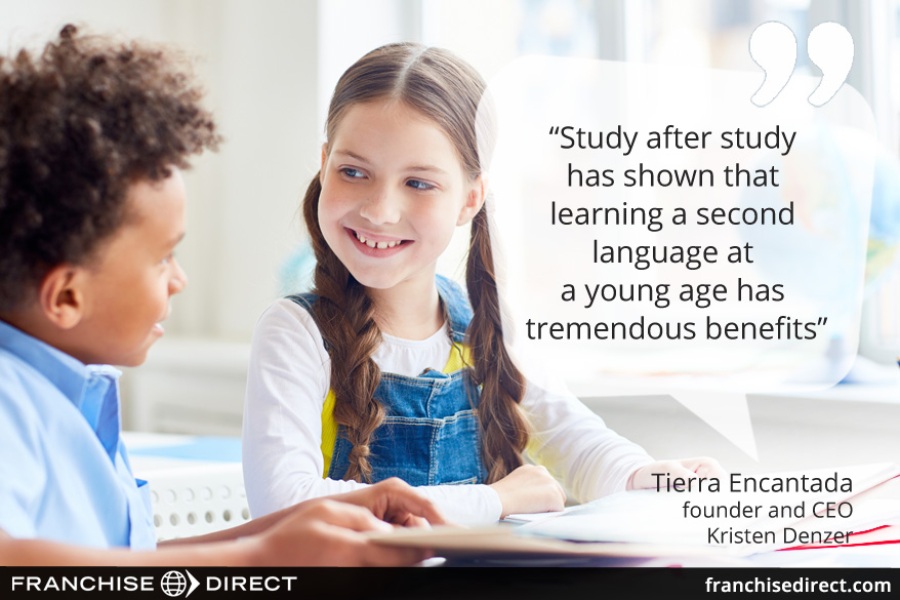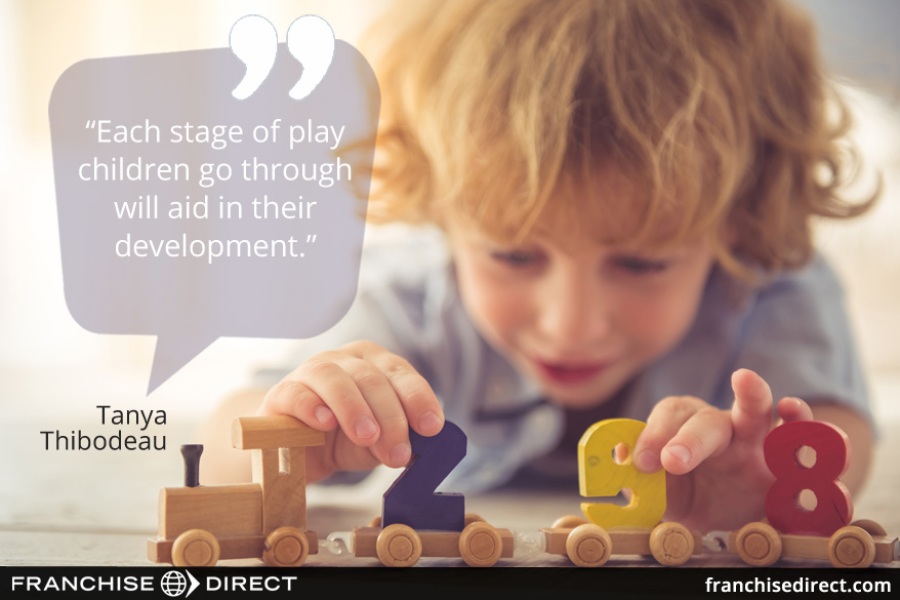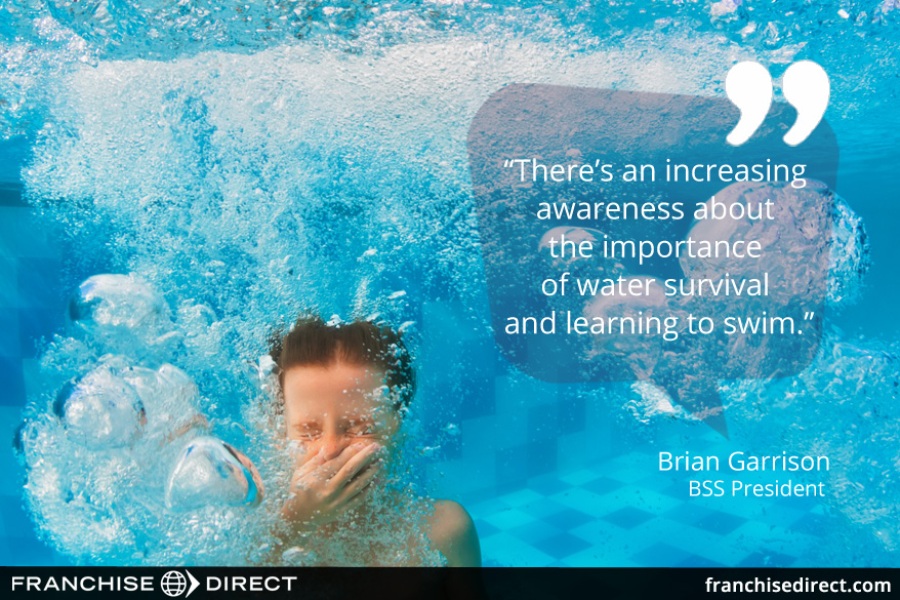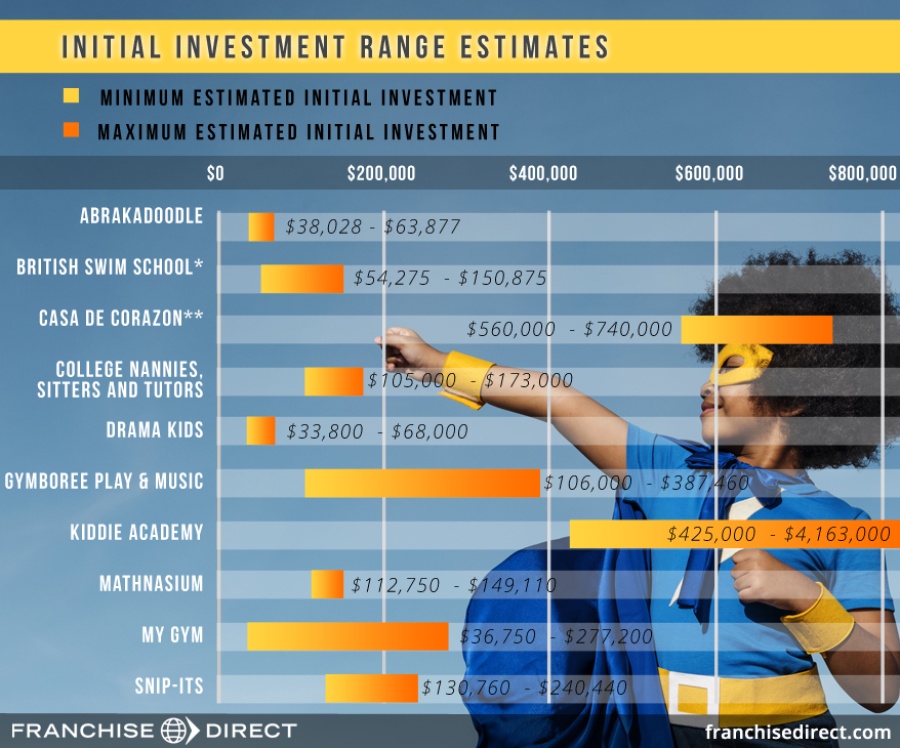🕒Estimated Reading Time: ~12 minutes

Parents spending on their kids’ extracurricular activities has steadily risen—and it’s not showing any signs of slowing.
According to a survey done by SunTrust Bank, 40% of American families spend more than $1,000 per year on their children’s extracurricular activities, and as many as 20% spend over $2,500. And these figures are on the low end, some extracurricular activities can add as much as $100,000 to a family’s annual monetary spending.
Children’s franchises today go well beyond the typical daycares and tutoring. Particularly because of the funding cuts to school and after school programs, nowadays you can find a children’s franchise for anything from fitness to cooking and so much more too.
In this report, we’ll focus on children’s franchises in three areas: expanding horizons, learning through play, and the always-steady education segment.
Trending Up: Language Immersion Child Care
“We are offering precisely what families today are looking for – and have the waiting lists to prove it.”~ Tierra Encantada Founder and CEO Kristen Denzer
The #6 franchise on Inc. 5000’s 10 hottest franchises in America for 2019 is at the forefront of a booming trend in child care: the increasing desire for language immersion education during early childhood. Tierra Encantada is a franchise that, as its founder and CEO says, “is a warm, community-oriented Spanish immersion educational program that provides care for children 6 weeks through 6 years of age.”
As described below, preschool language immersion programs range from “partial” to “complete” and “one-way” to “two-way” immersion.
- Partial immersion: Children spend 50% of the time with exposure to the foreign language and the other half with their primary, or native, language.
- Complete immersion: Children are exposed to the foreign language 100% of the time while at the child care facility or school.
- One-way immersion: A group of children who all have the same primary language learn in that language and the foreign one with the goal of proficiency in both.
- Two-way immersion: A mix of primary language-speaking students and foreign language-first speakers learn both languages together with the goal of both groups becoming bilingual.
The first language immersion programs are thought to be the ones set up by educators from McGill University in Quebec in the 1960s. According to the Center for Advanced Research on Language Acquisition at the University of Minnesota (CARLA), language immersion programs in the United States began in California in 1971. Spanish immersion programs like franchises Tierra Encantada and Casa de Corazon are the most common in the U.S., but French, Chinese and German programs are notably popular as well.
The main goals of language immersion are to:
- enhance cognitive function;
- improve academic performance;
- develop an increased awareness and appreciation of other cultures; and
- potentially increase the child’s employment prospects in adult life.

“Study after study has shown that learning a second language at a young age has tremendous benefits,” says Tierra Encantada founder and CEO Kristen Denzer. “Children who learn a second language in an immersion environment have been found to have improved cognitive functioning, outscore their monolingual peers in verbal and math standardized tests, and are more empathetic in their ability to understand another’s perspective in communications.”
But many franchises in this area aren’t stopping with just language immersion. They are also tapping into another trending desire for child care: an emphasis on natural living, complete with cloth diapers and fresh, organic food programs.
“Tierra Encantada is ideally positioned to address both the growing demand for childcare and the increasing awareness of the importance of organic food and language learning,” Kristen says. “With many markets not offering families a language immersion childcare option, Tierra will not only satisfy some of the immense demand for this growing [child care] market, it will provide parents an option they are excited about for their children.”
And don’t worry if you don’t have bilingual language skills. You can still be a franchisee in this field. If you’re not bilingual, however, you will need to hire a center director that is. Also, with the training aspect of franchising, you don’t need a background in education either.
For more information on Tierra Encantada, please see its profile.
Learning Through Play Franchises
Learning through play is a phrase commonly used in education and psychology to describe how children (1) make sense of the world, and (2) mature and gain skills as well as self-confidence to use in future situations.
Tanya Thibodeau, a former Pediatric Speech-Language Pathologist turned child development blogger, says she is a “strong supporter of children learning through play” as “each stage of play children go through will aid in their development.” As presented on The Center for Parenting Education’s website, these are her top three areas that benefit from learning through play.

Cognitive Development
Citing a 2002 study done by Doris Bergen at Miami University, she notes “if children are deprived of play, their long-term capabilities related to problem solving, social skills and academic areas (e.g. literacy, math and science) could be lessened.”
Communication
As Tanya says, “Play allows children the opportunity to develop speech and language skills as well listening skills.” And, while interpersonal play obviously increases a child’s vocabulary, solitary play also gives kids the opportunity to improve their narrative skills.
Relationship Building
The third area may be the most well-known. “Children who play with their parents and peers learn how relationships work through their play experiences.” Social skills such as the ability to develop connections and resolve issues are just two of the many capabilities enhanced by play.
Luckily for those who want to aid in kids’ development with play, there are several franchise options like the following five. (Note: Click on the name of each franchise to request more info.)
Imagine Arts Academy says its programs “challenge children to use their problem-solving skills in unique and exciting ways.” The franchise is an offshoot of childhood staple Crayola®, which was founded through a partnership between Mad Science Group Inc. and the company.
School of Rock “helps kids have a blast as they figure out who they are and develop the tools they need to rock productive lives.” The music education franchise combines one-on-one lessons with group rehearsals that culminate in a live performance.
songs for seeds utilizes a mobile franchise setup to bring its “live band and modern approach” to kids from newborn to six years old.
But you want to be sure that the play is safe as well as fun.
The tagline for British Swim School (BSS) is “Survival of the Littlest” and for them the saying is a foundational aspect of the franchise. The ultimate goal of BSS is reduce accidental drownings, which are the #1 cause of death for children under five in the U.S.
“There’s an increasing awareness about the importance of water survival and learning to swim, and recognition that these capabilities are not only distinct but also true life skills,” says BSS President Brian Garrison.

Education and Tutoring Franchises Remain a Favorite
Higher education and getting into college came into the spotlight earlier this year for all the wrong reasons. But thankfully for franchisees, Operation Varsity Blues or any of the other revelations surrounding the lengths some parents take to get their kids into college haven’t seemed to put any kind of damper on the industry. The billion dollar tutoring and test preparation franchise industry has enjoyed a solid annual growth rate of 3.1% over the past five years, while the overall U.S. tutoring industry brings in an estimated $5 billion yearly.
While franchises in this area tend to primarily focus on school age kids, the franchises cater to students of all ages. For example, Tutor Doctor has tutoring programs that range from elementary & middle school up through adults. The franchise even has specializations for home-schooled students, veterans, and those with special needs.
Speaking of specializations within the industry segment, new ones are popping up all the time. As STEM gained in popularity, Sylvan evolved its programs to keep up. Now, Sylvan is the largest provider of STEM programs in North America in addition to its tutoring, test prep and academic coaching services.
And the specializations don’t stop there. Take gifted children, for example. The National Association for Gifted Children (NAGF) says that, “Although Federal law acknowledges that children with gifts and talents have unique needs that are not traditionally offered in regular school settings, it offers no specific provisions, mandates, or requirements for serving these children. Currently, gifted education is a purely local responsibility and is dependent on local leadership.”
Seeing this gap in the marketplace, Tobi Phillips, Ed. D. (cert.) founded Village East Gifted, Inc. in May 2007 to provide enrichment for gifted students in grades kindergarten through college.
Children with autism have also become a focus for catered child education offerings in franchising. Hi-5 ABA Board Certified Behavior Analysts (BCBAs) help clients diagnosed with autism and/or other developmental disabilities resolve behavior problems, improve social skills, and become more independent.
In addition, the bond between child care and early childhood education has solidified.
Five years ago Richard Peterson, vice president of Kiddie Academy told us, “There's great demand for quality child care right now. It used to be that a parent was just interested in daycare, but now they're interested in quality education [as well].”
Those words have proved prescient. Newer daycare franchises like IvyBrook Academy and Celebree School were developed specifically with early childhood education in mind for infants and preschool aged children. These franchises employ specialized curriculum that provides an educational experience that, as Celebree states, “fosters a solid foundation for lifelong success.”
Buying a Children’s Franchise
Please note: the provisions and fees illustrated below (and in linked pages) are some of the most common and not a complete listing. Please review the Franchise Disclosure Document (FDD) of a franchise for all of the provisions and fees related to investing in that particular franchise.
Do I Need Experience?
As with virtually all franchises, previous experience in the franchise industry isn’t a necessity—just a passion for the area and the willingness to work hard. “Our ideal franchise owner will have a passion for both business and for making a difference in their communities, more specifically with protecting and safeguarding our youngest,” Brian of British Swim School says for instance. Franchisees “do not need aquatic experience nor necessarily experience working directly with children. [Though] it is typically more beneficial to have a good business background – either as a small business owner or in corporate America – combined with a passion for helping people.”
Behind the Scenes
Obviously you’re curious about what it’s like to run a franchise, so let’s go behind the scenes. In this video, as seen on Bloomberg TV, you’ll meet Steve McFarland, owner of School of Rock Carmel (Indiana), and his daughter Elyse Causey, the business's general manager. They give a peek into their lives as franchisees.
Initial and Opening Franchise Costs
According to Franchise Grade, the average initial investment for a children’s service franchise is $443,155. However, as their sector report notes, “there's a striking difference between the average and median” initial investment number. This is because the “most expensive franchise in this sector” has an initial investment of $4,941,400, which skews the average dollar figure high. Children’s franchises that have opening costs in the millions involve a significant land purchase and require a facility to be built. Many children’s service franchises have an initial investment range significantly under $200,000.
For illustration, the following graphic provides the initial investment range associated with opening 10 children’s industry franchises from a variety of industry segments. These ranges come from the Franchise Disclosure Document (FDD) of each respective franchise, dated 2019. Please review the FDD of a franchise for all of the provisions and fees related to investing in that particular franchise.

*The estimated initial investment range for British Swim School assumes no commercial office and is for a local territory. Please see FDD for estimates for a regional territory.
**The estimated range for Casa de Corazon does not include the real estate purchase or facility improvements.
Franchisors offer estimates on the opening costs in their FDDs based upon their experience establishing, and in some cases operating, units. However, prospective franchisees should keep in mind these estimates are just that—an estimate. Prospective franchisees should review the figures presented with a business advisor, taking into consideration their unique circumstances, before making the decision to enter into a franchise agreement.
Ongoing Franchise Fees
In addition to the opening costs, throughout the length of the agreement there are costs for being a part of the franchisor’s business system. These costs include items such as royalty fees, charges for technical support, and continued marketing costs.
The most common is the royalty fee. Examples of how royalties are collected are provided below for each featured franchise. Royalty fees are assessed for the continued use of the franchisor’s trademarks and patented processes, along with certain types of operational support. Like the initial investment ranges, these figures have been compiled from the FDDs of each respective franchise, dated 2019.
| Franchise | Royalty |
| Abrakadoodle | 8% of Gross Sales. |
| British Swim School | 10% of Gross Sales. |
| Casa de Corazon | The greater of 7% of the monthly Gross Revenue or $3,000 per month. |
| College Nannies, Sitters and Tutors | 5% of Gross Revenues. Minimum monthly royalty of $800/month starting 18 months after the Franchise Agreement is signed. |
| Drama Kids | The greater of 8% of Gross Sales or $200 per month. |
| Gymboree Play & Music | 6% of Gross Receipts. |
| Kiddie Academy | 7% of Gross Revenues. |
| Mathnasium | Initially, 10% of the monthly gross receipts from all sources as a result of operating the center, plus a base royalty fee of $500 per month (payable on the first center only). Beginning in the 24th month of operation of the center, the base royalty fee plus the greater of (i) the 10% monthly royalty or (ii) $1,500. |
| My Gym | Fixed Center (large model): 7% of Gross Volume. Fixed Center (small model): 8% of Gross Volume. Mobile Business: $125/month for first 12 months then $250/month thereafter; or 7% of Gross Volume if franchisees also operate a Large Model Fixed Center in same territory; or 8% of Gross Volume if they also operate a Small Model Fixed Center in same territory. |
| Snip-its | 5% of Gross Sales for the first year, and 6% of Gross Sales for the balance of the term. |
(More investment info can be found at the links in the table.)
In addition to regularly assessed fees, other fees are charged on an “as needed” basis such as audit fees, or costs for additional, non-mandatory, training. Prior to investing, prospective franchisees should do their research and carefully review a franchisor’s FDD for more detailed information on all systems, procedures and costs.
To see our complete listing of franchises that enrich children’s lives, please see our children's franchise profiles.














